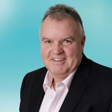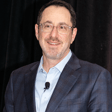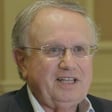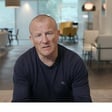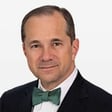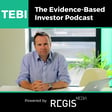Become a Creator today!Start creating today - Share your story with the world!
Start for free
00:00:00
00:00:01

Ep 29: David Ricketts on the Neil Woodford scandal
Journalist David Ricketts has written a new book analysing the public fall from grace of "Britain's Warren Buffett", Neil Woodford.
Transcript
Introduction and Sponsorship
00:00:03
Speaker
Hello and welcome to the Tebbe podcast from The Evidence-Based Investor.
00:00:08
Speaker
I'm Robin Powell and this podcast is brought to you by Regis Media, a niche provider of educational and marketing content for financial advice firms. Yes, this is the first Tebbe podcast for quite a while. We've had to put it on hold during the coronavirus pandemic. But we're back and here to stay.
The Fall of Neil Woodford
00:00:28
Speaker
In this episode, we're focusing on the man they used to call Britain's Warren Buffett, Neil Woodford.
00:00:35
Speaker
It's been more than a year and a half since the Woodford Equity Income Fund, run by the former staff fund manager, was suspended. Since then, investors in the fund, now called the LF Equity Income Fund, have endured a frustrating time, with little apparent progress being made towards securing compensation for those affected. And we're still awaiting the findings of inquiry into the affair from the UK regulator, the Financial Conduct Authority.
David Ricketts on Woodford's Downfall
00:01:05
Speaker
I've been speaking to the journalist David Ricketts, who's written a new book on Woodford's spectacular fall from grace. It's called When the Fund Stops. In this interview we explore some key questions. Could Woodford's demise have been foreseen? Where exactly did he go wrong?
00:01:25
Speaker
Why wasn't more done to protect investors? Who's to blame? And will we see more Woodford-style scandals in the future? David, thank you very much for joining us. Thanks Robin, glad to be here.
00:01:45
Speaker
And I've really enjoyed reading your book over the Christmas period. I should have been relaxing and enjoying myself, but I couldn't put it down. Seriously, I really enjoyed it. That's good. Thank you very much for the comments.
00:02:00
Speaker
So tell me, how did this
What Went Wrong with Woodford's Fund
00:02:02
Speaker
all start? I mean, I know you were approached by the publisher about writing this book, but as a journalist, what are your memories of, I suppose, beginning of June 2019 when this whole story broke?
00:02:19
Speaker
Yeah, this, I would say has to be certainly one of the most exciting and also probably the most shocking stories I've worked on as a financial journalist. So I've been a financial journalist now for well over 10 years. I actually started my career.
00:02:33
Speaker
just before the onset of the financial crisis in 2008. And just when I thought things were getting interesting back then, little did I know that things like the Brexit vote and also the onset of COVID would cause a lot of excitement. But, you know, Woodford was one of those stories that really kind of got the interest of financial journalists right from the outset. I think we can go back right to the
Woodford's Departure from Invesco
00:02:59
Speaker
departure of Neil Woodford from Invesco in 2014 itself, which I think was, you know, at the time, it was very big news. I remember speaking to financial advisors at the time who said to me, this is the biggest story in the decade. So even his announcement, leaving Invesco after more than 20 years as a fund manager, there was was big news. And
00:03:20
Speaker
Neil Woodford has been one of those kind of characters that all financial journalists that cover the fund management sector have followed over the years. So I think the initial excitement about him leaving Invesco and selling his own firm, that certainly got a lot of interest and the coverage around that was immense. But I think actually you're right that June 2019, the announcement that Woodford's
00:03:46
Speaker
one-time flagship fund which at its peak managed more than $10 billion of assets. The fact that that was being suspended, the assets had dwindled down to around about $3 billion and the decision was made to suspend that fund. It was a big shock to everyone who followed Woodford, not least obviously the investors who were locked in that fund afterwards.
00:04:11
Speaker
You know, the memory, ever had a memory really at that time was, you know, there was a meant shock and surprise that this decision had been taken. And really, it was the case of, you know, how is, how is Neil Woodford going to pull back from this, because we had been covering this story in the run up to June 2019, we'd seen the huge outflows from that fund over several months.
Woodford's Rise and Struggles
00:04:33
Speaker
That peak in 2017, I mentioned where he was managing 10 billion,
00:04:38
Speaker
shortly after that period that's when the outflows started to occur and you know I think what was the writing on the wall I don't know but I think actually you could sense that the Woodford was starting to struggle after that point there were a succession of profit warnings that were issued by some of the big companies he invested in that obviously spooked investors they started to pull money out of the fund
00:05:00
Speaker
And it was really kind of a battle for Woodford to contain those outflows and raise enough money to pay investors back. So the overriding kind of memory of that period was, yeah, a lot of shock and surprise. Really kind of thinking, how is Woodford going to pull back from this? Now, I'm guessing the vast majority of people listening to this podcast will know of Neil Woodford and know about him.
00:05:27
Speaker
And we do have a lot of listeners overseas. So maybe you could just paint a little picture, if you would, David, of Neil Woodford. And, you know, let's face it, he was spectacularly successful in Vesco Perpetual. Yeah, that's right. I think actually one of the things I was quite keen to do in the book was really paint a full picture of the rise of Neil Woodford as much as his downfall. Because I think one of the things I try and get across in the book is one of the reasons this
00:05:57
Speaker
this downfall was so shocking, as you rightly say, it's because he was a very well-known fund manager in the UK. I mean, he kind of had this rock star status, if you like. And Invesco, you're right, I think he really did sort of have a reputation of being unfathomable, if you like. I think the period where he made a real name for himself was in the run up to the tech bubble bursting. He was one of the few fund managers that refused
00:06:24
Speaker
to pile into tech stocks when all those around him were doing so, he refused to follow the herd. He was somebody who invested in traditional stock food chip companies, particularly tobacco stocks. And actually, tobacco stock won the big winners for Woodford in the early part of his career. And he remained true and loyal to those stocks during the late 90s, while everyone was kind of getting very excited about the tech
00:06:50
Speaker
tech boom and even a lot of function advisors and people that were supporters of Woodford started to question him at that point saying why isn't this guy following the herd and getting into this kind of booming sector and as we all know I mean when the tech bubble burst you know he was he was vindicated actually you know that's when he made
00:07:11
Speaker
you know a lot of money for his investors and he went on to make a lot of personal wealth as well and I think um Invesco he really sort of was considered the staff fund manager um there were a lot of changes going on internally with um when Invesco um acquired Perpetual which was um you know it was based in Henley you know he was seen as somebody who was
00:07:30
Speaker
calling the shots in some ways, he was a staff manager, he refused to move to, to London and kind of get involved in the kind of culture, if you like the financial culture of the other kind of city, big firms. And yeah, I think investors where he really made a name for himself. And by the time he left, he was managing north of 30 billion pounds sterling in two of his big funds, the high income fund, and the income fund. And just the tech
00:08:00
Speaker
the tech bubble where he made a name for himself. He was also one of the few fund managers that didn't hold any banks in the run up to the financial crisis. So again, he proved that he was very successful at navigating some of these very choppy and very volatile times. I was thanks to that, that he gained such reputation. And he became the sort of darling, the poster boy, if you like, for the UK fund management industry. And yeah, rightly so. I think he did very well at Invesco and he generated returns for his investors.
00:08:29
Speaker
I mean, there's this often sort of quoted stat that somebody who invested I think a thousand pounds with him at the start of his career in 1988 would have been sitting on more than 25,000 pounds, you know, 25 years later. So any investor would be very happy with those returns. And I think, you know, even some of the media coverage around would fit at the time.
00:08:53
Speaker
that he left investigate, it was a BBC online article that called him the man who can't stop making money. So he really was seen as somebody who's head and shoulders above the rest, he had this rock star status. And again, that, that is what made the downfall all the more surprising. As you say, you know, turning 1000 pounds into 25,000 pounds, I mean, that is not to be sniffed out that kind of achievement.
00:09:19
Speaker
I mean, I would qualify that by saying, how many people actually spotted this guy before he started outperforming? That's the first thing.
00:09:31
Speaker
How many stuck with him while, as you say, everyone was saying, look, Woodford, why aren't you getting into, you know, dot coms in the late 1990s? How many people stood with him all the way through that? How many people stood with him, you know, up to the financial crisis, you know, when, as you say, he was avoiding banks and so on?
00:09:56
Speaker
It must be a very, very small proportion of the total number of people who've ever invested in Woodford.
00:10:03
Speaker
who actually benefited to anything like that extent. But I absolutely understand what you're saying. It's a huge achievement, isn't it? It is. I think it's very difficult to qualify. We don't have the numbers to suggest people that did invest with him early on in his career would have benefited from that had they stayed with him. I think that's the thing about investment. It's a very long-term game. And your hindsight is also a wonderful thing. We can go back and look at stats and certainly portray fund managers in certain ways.
00:10:31
Speaker
based on statistics. But what I think is clear is that a lot of people did follow Neil Woodford from Invesco to his new venture. So that was very evident. By the time he announced that he was leaving Invesco, Mark Barnet, who was his kind of protege, if you like, at Invesco, was certainly struggling to contain the outflows from those two funds, the high income and the income fund.
00:10:55
Speaker
Invesco lost a huge amount of money from those funds when Woodford announced that he was leaving. A lot of that fund money went with Woodford to his new venture. I think, again, one of the surprising elements in all of this, the downfall was that
00:11:11
Speaker
within the first few months of setting up his new business, he was managing five billion pounds of investor assets. I think the equity income fund, when it was launched, it broke records in terms of the money it gathered from investors during the launch period. So you're right, we can't tell whether the investors, whether those investors did benefit from that the entire sort of 25 year success.
00:11:40
Speaker
it's very clear I think to say that he did have a loyal fan base that walked out of the door with him from Ivesco to his new venture and hopefully they were obviously hoping that he could replicate the success that he'd achieved at Ivesco. Now the question of course that everyone wants an answer to and we still have probably had it is how did a guy go from being a hero to zero you know how was he such a star
00:12:09
Speaker
at early Invesco Perpetual and then for things to go so badly wrong in the next venture. And I think one of the most interesting things to come out of your book is that you actually say, well, in a sense, you know, there were the kind of seeds, if you like, of his eventual collapse being sown, even while he was still at
00:12:35
Speaker
Invesco Perpetual. He started off, as you say, very much as a kind of investor in big, safe, traditional stocks. But actually, in the latter years, from 2000 and
00:12:49
Speaker
eight, nine onwards. He was actually investing more and more in early stage companies, wasn't he? Yeah, that's right. I think that the latter years that he was invested, he started to venture into some of these less liquid companies, the smaller companies that aren't listed necessarily on the stock exchange. So
00:13:06
Speaker
He spotted an opportunity here, which he thought was a great investment. Potentially, these companies would offer higher potential for growth. And it wasn't as though he was piling into these companies at a huge rate. I think actually a lot of the financial advisors that I spoke to for the books mentioned to me that they knew that he was starting to stray into some of these areas, but it wasn't to the extent
00:13:28
Speaker
that it got to this new venture. We can actually talk a bit more about that. But he did start to move into some of these, I suppose, newer territory, if you like. And I think actually, what we started to see towards the end of his career at Invesco was that there was a change in management as well at the time. So there was a new chief investment officer who was brought in. I suppose the culture had changed somewhat at the firm as well. So
00:13:53
Speaker
They began to ask a few more questions about the investment process that Woodford was taking. There was an investment committee that was set up to oversee or maybe keep a check if you like on some of the investments.
00:14:06
Speaker
that were being made by Woodford and that was directly reporting to the new Chief Investment Officer. And I think there's a sense from speaking to people that worked with Woodford and Invesco during his latter years, there was a sense that things had started to change and I think he became aware that he was being asked more questions about his investment process, perhaps
00:14:29
Speaker
You know, he wasn't used to that kind of level of scrutiny. He was kind of used to doing the thing he'd always done with Invesco and kind of being given sort of free reign to invest in companies, you know, that he thought would deliver the best returns. But I think, you know, the culture had started to change at Invesco. He's being asked a lot more questions about some of the investments he was making. And I think he started to feel that maybe he would be better off outside of a big organization where there was a kind of overbearing
00:15:00
Speaker
sense of compliance obviously a very important function of the fund manager but there were a lot of kind of hoops to jump through and a lot of questions that were being asked so you know I think that the sense was that maybe if he struck out on his own
00:15:12
Speaker
he could make a lot more of these decisions himself and justify these decisions if it was just to him and his immediate compliance team of a few people as opposed to a team of how many people work in Invesco. But again, another important point to mention at this stage is that there was an FCA fine that was handed down to Invesco and it was announced just I think a month before Woodford was due to launch his new fund. What was interesting was that the FCA
00:15:42
Speaker
who found that about 15 Invesco funds, including Woodford's high income and income funds, exposed investors to higher levels of risk than perhaps they were led to expect. So there's nothing wrong with investing in companies that aren't listed. I mean, there are lots of fund managers who do that. And we can talk a bit more about the rules that were governing Woodford fund, European rules called USITS, which do permit
00:16:09
Speaker
funds to invest in in unquoted companies but there is a threshold that needs to be kind of met if you like you can't exceed 10% of the funds assets for example. So there's nothing wrong with investing in unlisted companies per se but I think the issue that became more apparent as Woodford moved into his new venture was were investors fully aware of the extent to which he was doing this and I think
00:16:36
Speaker
one of the reasons that would for perhaps did come unstuck towards the end. I mean, it's really fascinating when you look into the outflows and the kind of proportion that the unlisted companies made up of his fund towards the end. I mean, there was a huge kind of exposure to unlisted companies towards the end as he was having to sell down some of the holdings in more liquid companies to meet those redemption requests. So
00:17:04
Speaker
So you're right, I think if you had started straight into these companies, the unlisted companies during the end of his career in Evasco, at that stage, it wasn't a concern. I think actually, even with the launch of equity income fund in 2014, we started to see maybe a continuation of this trend. There were a few unlisted companies that were announced in the portfolio when the fund was launched, but nothing to the extent to which it ended up
00:17:34
Speaker
four or five years later I think it probably did take a few people by surprise the fact they had straight into these companies to such an extent towards the end.
00:17:43
Speaker
There's some interesting colourful personal information as well that you include about those latter years at Invesco. He lost his temper fairly often. He insisted on having his own office separate from the rest of the team, which had always been the way that they'd done things there.
00:18:08
Speaker
You also describe at one stage how he and a few friends would go to the gym, the company gym at lunchtime and really kind of get pumped up. Tell me about that. Yes, so again, this is what makes the story really interesting is when you start delving into the characters and the way that the people behave. I think one of the great things about writing a book is that you can really
00:18:33
Speaker
get into the the fine detail if you like and speaking to former colleagues you're absolutely right so so I think one of the things you know going back to this this kind of star status that Neil Woodford had in Invesco I suppose you could call it ego as well I think you know he'd obviously got to a stage where he was clearly Invesco's
Woodford's Personality and Management Style
00:18:52
Speaker
star performer and he kind of had this, as you say, remote kind of cut off office from the rest of the team where he was allowed to kind of hold conference calls and get away from the distractions of the office.
00:19:06
Speaker
And yeah, I mean, I spoke to a few people that said that he would occasionally lose his temper, not necessarily with with other people at Invesco or one leagues. But having a glass office, of course, means that that all of this emotion is on public display. So people would often see him lose his temper or get frustrated at various things in his glass office. And you're right, there was
00:19:28
Speaker
Woodford is a fitness fanatic. He's a he's a rugby fan. He played rugby at a very young age. He continued following rugby all the way through his through his career. And yeah, he would often go to the in house gym investigate perpetual, which again, I was told by former colleagues, he was one of the people that insisted on on an in house gym, their heavenly office.
00:19:49
Speaker
And yeah, it was kind of a way for him to let off steam and for his colleagues to join him. I think there was a quote in the book talking about him being seen in the gym and a couple occasions shouting at the wall if he's lost his temporal frustrated or something. So it was an outlet, I guess, for him to let off some of that frustration. But yeah, I suppose the characters, the ego,
00:20:13
Speaker
this kind of sense of Neil Woodford being a kind of key personality at Investigate Perpetual was certainly something that came out of the conversations I had with some of his former colleagues. Now, a lot of former colleagues as well talked to me about how Neil Woodford was also a great mentor to them and a great sort of person to speak to and learn and get knowledge of. So that's one thing I wouldn't want to lose sight of.
00:20:40
Speaker
Yeah, it's kind of a mixed response I got from people working there. So people that said they learned a lot from him and thought he was a great person to look up to. And other people said that you have to choose the right moment to go and approach him if you had a query about something because you didn't want to go on the wrong side of him necessarily. And again, that comes through as well with some of the meetings he had with chief executives of companies he invested in. He would often
00:21:05
Speaker
summon them to the head of the office to hold meetings with them because he had that he had that status he could do that he was such a powerful investor normally you'd expect for managers to go to to the offices ahead offices of companies they invest in but but it kind of worked the other way around
00:21:21
Speaker
As you were saying, he had this aura, didn't he, when he set up his own firm in 2014, had this aura of a man who couldn't stop making money, I think was a phrase that BBC wants used.
00:21:41
Speaker
A lot's been made of Hargreaves Lansdowne, rolling all this. And I always think, well, Hargreaves certainly weren't the only people who were saying this guy was the best thing since sliced bread. There are lots of guilty partners, players here. But I think you describe Hargreaves as the loudest cheerleader. How significant do you think were Hargreaves Lansdowne?
00:22:10
Speaker
in creating the Woodford myth, if you like. Yeah, I think you're right. There was, undeniably, they helped create a buzz around Neil Woodford, particularly around the time that his fund was launched. I mean, if we go back to 2014, when he announced that he was leaving investigative petrol, I mean, almost sort of immediately, there was this announcement that he would be setting up his own fund management business soon after he'd be launching the Appetee Income Fund.
00:22:38
Speaker
Hargroves Lansdowne had this agreement with Woodford that they had this special fee structure in place that would mean there would be the cheapest venue for people to invest in Woodford's new fund. And if you go back and look at some of the promotion material around Woodford's fund launch, it gave the impression that Woodford was certainly, as you say, the best things in slide spread. I mean, there was a lot of promotion around Woodford, the fund manager,
00:23:04
Speaker
and the brand of Woodford and we had the likes of Peter Hargreaves, the co-founders of Hargreaves Landstown.
00:23:12
Speaker
even saying, you know, he would invest his own personal wealth in Woodford's fund. And also, like Sophia, Mark Dampier, who was head of investment research, saying that him and his wife would also be investing money in the fund. So there was a lot of excitement, and you're right, Hargreaves Lansdowne certainly did throw everything they had at this launch. And from speaking to a former colleague, a former people that worked at Hargreaves Lansdowne,
00:23:37
Speaker
you know there was undeniably a buzz around Woodford when this fun was launched and
00:23:42
Speaker
what they said to me was that this was one of the biggest promotional sort of drives of your marketing campaigns they'd ever seen. I think they went back and I think they cited to me the listing of Royal Mail several years early, which actually, again, that was a big promotion for Harbury's Landstone, but the Woodford campaign, if you like, blew that out of the water and it was, you know, they threw absolutely everything at it.
00:24:08
Speaker
So you're right, there was actually a lot of buzz and excitement created by Hargreaves.
Promotion and Oversight Failures
00:24:14
Speaker
The fact that it was also included on their buy list, so the wealth, 150 as it was known at the time, also helped generate a lot of interest. And speaking to investors who went into Woodford's fund, I mean, again, you can probably say with some certainty that they were drawn in
00:24:34
Speaker
as well by some of the the marketing around Woodford and the fact that it was on this this buy list it helped to generate interest as well. I mean Wealth 150 list is Harbury's list of preferred funds if you like, backed by what they say is a rigorous internal research process. So if you're an investor, a DIY investor on Harbury's Lansdowne
00:24:54
Speaker
trying to whittle down thousands of funds to a select few, you rely on these buy lists to a certain extent. Having that fund on the list certainly generated a lot of buzz as well.
00:25:07
Speaker
So as you say, many Hargreaves, Lansdowne insiders put their money where their mouths were and invested with Neil Woodford. And clearly, they will have not done very well as a result of that. But we're talking here about, you mentioned Peter Hargreaves there.
00:25:30
Speaker
you know, net worth 3.7 billion US dollars. He's seven times richer than the Queen. Mark Dampier and his wife,
00:25:41
Speaker
The Daily Mail reported shortly after this whole thing blew up in June, had just before it all happened sold many million pounds worth of Hargreaves Lansdowne shares, which had no doubt benefited hugely from all the interest surrounding Woodford. He has been a massive money spinner for Hargreaves Lansdowne.
00:26:07
Speaker
And yet, as a former staffer at Hargreaves says in your book, there was a lack of what he called, or she called, Belton Brace's analysis of Woodford by Hargreaves Lansdowne. This insider describes how Woodford wouldn't visit very often, but when he did, he didn't say very much, and there wasn't any kind of detailed questioning of him, if you like. Well, that's shocking, isn't it, David?
00:26:36
Speaker
Yeah, I think there was there was an expectation, I think, from a lot of people that worked at Harbury's Landstone that Woodford would simply continue his run of success from Invesco and certainly just move that travel record across.
00:26:49
Speaker
As you say, from speaking to form people that work there, I think they were taken a bit by surprise that there wasn't this kind of initial scrutiny that was placed on the fund. I think actually, it goes back to the fact that perhaps the focus was too much on Woodford, the fund manager and not Woodford and his new fund, the Woodford Equity Income Fund.
00:27:12
Speaker
You're absolutely right. I think there was an expectation that perhaps there would have been a more rigorous questioning around the fund launch and perhaps what it would include, you know, would he deviate from the investment approach that he had at Invesco Perpetual. But, you know, I suppose playing devil's advocate here, one could argue that maybe Hargreaves lands down, you know, he had a proven track record over 20 years.
00:27:34
Speaker
But he wasn't the young upstart. He was certainly somebody with a with a proven track record. I think the expectation was that perhaps that he would just carry on deliver as he had done. But I think you're right. I think from speaking to other people at Harbor East, the fund.
00:27:49
Speaker
wasn't given the same level of scrutiny as perhaps some other new fund launches would have been. I suppose it may have been just a case of going through the motions and going through a checklist of what's the investment process like, has it deviated from what you think it would have been a chance to ask a few tough questions and probe Woodford about the approach he was looking to take. But what I think
00:28:16
Speaker
did become clear. I suppose that we're talking here about the initial fund law. But what did become clear in the research of the book, and certainly through some of the tierra that was shared with the Treasury Committee that looked into all this, was that Hargreaves did start to raise questions and ask questions about some of the liquid holdings, certainly as the fund was approaching its suspension.
00:28:42
Speaker
And in particular, the breach of that 10% threshold that I mentioned, that's part of the EU rule. So I think questions were being asked by Harbros, but I think the confusion is, why were those questions not asked earlier on?
00:28:57
Speaker
And while those questions were being asked, why was that fund still on the wealth 150 list or the wealth 50 list as it was later called? So, yeah, I think Harvard comes in for a lot of flack over the support they gave Woodford, the lack of detailed questions that were being asked, but also the fact that this fund remained so prominent on this buy list for such a long time, even though
00:29:20
Speaker
performance was tanking, concerns were being raised about the allocation to some of these unquoted companies. So I think that's where I think a lot of the questions do lie with algorithms. It was championing this fund at a time when people were starting to raise some concerns about it.
00:29:39
Speaker
And what about link fund solutions? Without getting too technical, link fund solutions are what's called an ACD, an Authorized Corporate Director of the fund. And as such, they had a fiduciary responsibility to
00:29:58
Speaker
people who invested in the fund, a, to make sure that their money was being sensibly invested. And secondly, crucially, that, you know, if they wanted to get their money out at any time, they could. And, you know, it does appear very plain that they failed investors on both of those counts. Yeah, I think actually, this is another interesting in the whole story is, as you already say, the authorised corporate director,
00:30:29
Speaker
It sounds like a very unglamorous and unsexy sort of role, but it's a crucial role in the role of fund managers. You're absolutely right. So they have responsibility to make sure that the fund manager is fulfilling their duties and treating investors fairly. And actually the fund is kind of sticking to the rules. What is interesting actually is that it was at its link who is
00:30:57
Speaker
answerable to the SCA, not Neil Woodford that the fund managers know.
00:31:02
Speaker
Another important element I think which I try to get across in the book as well is that one of the reasons that the fund suspension I think came as a surprise and we talk about this where I talk about this in right at the start of the book is that Lincoln and Woodford obviously having conversations about the route the fund was taking. They could obviously see that the outflows were continuing at such an alarming rate. They were talking about the kind of liquidity profile of the fund
00:31:31
Speaker
One of the key triggers for that suspension back in June 2019 was the fact that one of Woodford's largest clients, so County Council pension fund, they took the decision that they wanted their entire investment back, which I think at the time was roughly 240, 250 million pounds. So that was a huge sum of money to pull from a fund in one go.
00:31:56
Speaker
In the run-up to the fund being suspended at the start of June, conversations were taking place between Lincoln and Woodford about what would happen to the fund if Kent County Council were to redeem that holding. Could the fund continue the way it is?
00:32:14
Speaker
What would the courtesy profile look like? Could the fund offer Kent a managed redemption? So rather than pulling the fund, the whole holding in one go, could it be staged over several months to enable the fund to continue operating? And it wouldn't be such a blow to other investors. So a lot of conversations are taking place behind the scenes. And actually from speaking to people that worked with Woodford at the time,
00:32:41
Speaker
That decision was a surprise to them to suspend the fund. And again, that decision was taken by Link, not Neil Woodford. So the conversations that were taking place in the weekend prior to that fund suspension taking place were, how could we manage County Council's redemption?
00:33:00
Speaker
from what I've been told from people that worked with Woodford at the time, is that the idea of the fund suspension wasn't mentioned in conversations right up in the weekend before that. So the pension obviously was always a possibility, but I think it wasn't a measure that Woodford was expecting to take place at the start of June when it was announced.
00:33:26
Speaker
Yeah, Link have come to a lot of scrutiny over the way that the suspension was handled. And obviously, we now look more than a year on now, they are now responsible for offloading the assets that are left in the fund. And a lot of questions have been raised about, have these assets been sold off at far sell prices? Could a better price have been negotiated or reached for some of these assets?
00:33:53
Speaker
that the whole process of paying back investors in that fund is certainly coming for a lot of scrutiny as well. So Linker, another character, another actor, if you like, in this whole saga that certainly have received a lot of attention and have a lot of, I suppose, questions to answer. And what about the Financial Conduct Authority? As you say, they find Invesco just at the end of his time there.
00:34:23
Speaker
And you could say, looking at this, that they should have spotted this coming. Maybe they should have asked more questions earlier. Andrew Bailey, now Governor of the Bank of England, who was then the head of the FCA, went hauled before the
00:34:42
Speaker
the House of Commons committee that deals with these things was asking, do you read the papers? You quote that in the book. Did the Financial Conduct Authority let investors down? Was it asleep at the wheel, if you like? Well, I think the interesting thing is that we're still waiting to hear from the FCA.
00:35:10
Speaker
you know about the the findings from an investigation they have launched into the events leading up to the fund suspension back in June 2019 so so far they failed to provide any indication of what this this investigation might include or when it will be published so I think that's the first thing to say is that you know the FDA announced pretty pretty much soon after the fund was was suspended that they would look into
00:35:35
Speaker
how the events that led up to that decision being made and anything that could be learned from that. So that's the first thing it says. It was still investors, journalists, everyone who follows this story are still waiting for that publication from the FCA. But what I think is interesting, and you alluded to this question, is that the FCA certainly gave the impression that they did fail to act on some of the red flags perhaps sooner than they should have done. The fact that
00:36:01
Speaker
they became aware of Woodford's decision to list some of the unquoted assets in the equity income fund on the Guernsey Stock Exchange after reading press reports. That didn't go down well at all with the Treasury Committee and Nikki Morgan who was chair of the committee at the time. And I think it emerged shortly after the equity income fund was suspended that the Guernsey Stock Exchange had tried to contact the FCA
00:36:27
Speaker
a couple of months previously to discuss some of the concerns it had over valuation of some of these unquoted assets. But a detailed discussion didn't take place between the two sides until the fund was actually suspended. So it was probably about six, seven weeks until a very detailed discussion took place. And there were various reasons for that. I think one of them being that the communication was picked up by a GED member of staff, for example, at the FCA. So there were various excuses and various reasons for that that were given.
00:36:57
Speaker
But I think it's also important to recognize that the FCA haven't exactly covered themselves in glory in the past as well. And most recently, there have been two reports that have been published, looking at failures at the FCA in relation to how it sort of failed investors, if you like. I think one was how they oversaw the collapse of a Cornell fund in 2012. So this was a fund which
00:37:24
Speaker
it left over 1,200 investors in nursing losses of more than 100 million. So the report that was published fairly recently before Christmas delved into this saga and concluded the FCA could have acted in a more effective way to protect investors in that fund. And again, before Christmas, looked at the FCA's role in the collapse of London Capital of Finance back in 2019.
00:37:53
Speaker
again the report uncovered serious failings about how the FCA regulated this this entity which included I think you know failure to act on some allegations that were made to the regulator by third parties. So what I think will be interesting is to watch what comes next both from the FCA but also
00:38:15
Speaker
Maybe from politicians, I know before Christmas as well, the All-Party parliamentary group on personal banking and Fair of Finance, they've called for a debate into what measures might be needed to get the FCA fit for purpose, if you like. So I think there is certainly an impression or a feeling that the FCA fail to act sooner, but until we get
00:38:44
Speaker
answers from their report into the Suspension Fund, which actually, interestingly, won't look into the FCA's own role in all this, so perhaps we won't get any answers from that. It remains to be seen. But yeah, certainly the impression that the one got from the Treasury Committee was that, yes, the FCA certainly were asleep at the wheel on this occasion.
00:39:09
Speaker
So do you think generally, David, that regulators, politicians, journalists like you and me, that all those people have learned things as a result of this scandal?
Lessons from the Scandal
00:39:25
Speaker
Do you think it has changed opinions? Do you think it's made us question the kind of star manager culture more? Do you think it's made us question as well
00:39:38
Speaker
you know, the huge amount of money that investors spend in fees and charges, not just ordinary retail investors, but as you say, local authorities like Kent County Council spending vast amounts of money to these active fund managers every year. Do you think lessons are being learned as a result of it? I think lessons,
00:40:07
Speaker
have been learned to some extent. I think one, one lesson that we can probably take from this is that actually the star, the star of financial culture, if you like, that existed, you know, during the Woodford's Hay days is certainly on the way out, if not probably on its knees already. I think it's probably fair to say that that kind of focus on one particular individual is, is certainly being played down, particularly at investment management firms. When you speak to investment management firms now,
00:40:36
Speaker
they're very reluctant to say that they they operate a star from magic culture and they talk about the process of having a team in place because nobody wants nobody wants a farm manager holding all the assets and suddenly announcing the departure and the money goes out the door with them that that's it that's a key man risk to it to any business I think
00:40:57
Speaker
If we go back to talking about the start of the conversation about stories I've covered in the past, if you go back to an example at PIMCO, for example, a big US bond fund manager, one of their star players, a guy called Bill Gross, who was one of the co-founders of the firm, he walked out the door in 2014. I think he managed in excess of US$200 billion. PIMCO were nursing significant outflows when he walked out the door. I think as a result of that, they changed the process to focus from
00:41:27
Speaker
far less of an individual into a more team and sort of collegiate culture. So I think it's fair to say that the staff from Andrew culture is certainly, has certainly taken a beating as a result of this. I think one of the lessons, maybe it's a hard read, Lansdowne's credit here that they've learned is they have certainly overhauled their, their own internal processes when it comes to their buy list, if you like. So as to the wealth one, the wealth 50 list has now been
00:41:54
Speaker
called the wealth shortlist. And that now has improved kind of risk monitoring process, which will close in liquidity. But interesting, one of the things that came out when I was doing research for the book is actually they focus a bit more attention now on the media profile of fund managers, because perhaps one of the things that caught a lot of people off guard was the fact that the coverage that Neil Woodford got, did it exacerbate problems for him? It probably did, yeah, because
00:42:26
Speaker
think the media can be blamed for the downfall of Neil Woodford. I mean he was the man making the investments and certainly you know you can't blame the media for all his woes but I think you know it's certainly true to say that you know when these companies that he was investing in you know announced profit warnings certainly there was heightened attention on his investment process and I think a lot of investors
00:42:52
Speaker
did get spooked by that coverage and I think you know that you certainly pulled money as a result of reading stuff in the newspapers and actually going back to you talk about Kent County Council and the pension fund you know that is overseen by a committee of trustees so these are people who don't have investment backgrounds like they are people who are you know Kent County Council councillors and they're they're investing you know money on behalf of pension scheme members
Impact of Media and Book Release
00:43:19
Speaker
but
00:43:19
Speaker
going through some of the minutes of meetings that took place, it was quite clear that they were having concerns or raising concerns following some of the coverage that Woodford was getting in the media. So, you know, I would say that the one has to be very, very careful about how individuals are portrayed in the middle built up, if you like, because this happened again. Yeah, until until we get a sort of answer from the FC about any action it might take.
00:43:48
Speaker
There are certainly still people in the fund management sector who are on a pedestal, if you like, and are kind of seen as a star performer. So I'm not saying that they are in any way similar to Tineal Woodford, but I think we are starting to see a bit of a divergence away from that. But there are still people in the industry who are held in very high esteem, absolutely.
00:44:14
Speaker
Just to clarify, David, I'm not suggesting in any way that the media was responsible for the downfall of Woodford, more for raising false expectations among hundreds of thousands of people who, on the basis of all that positive publicity, if you like, parted with their precious life savings.
00:44:38
Speaker
and handed it to Woodford to manage. David, this has been a really fascinating conversation. I'm really grateful for your time. Just very, very briefly. Tell me the name of the book, the publisher, when it's out, how people can get it, and so on. Yeah, so the book is called When the Fund Stops. So it's out in January, the 26th of January. So it can be ordered from
00:45:05
Speaker
from Good Book Show, I hope it's Amazon, elsewhere. Harriman House is the publisher, you can also buy it on Harriman House, the website there. I really hope that it would shed some light on this whole saga, the whole episode, for people that were invested in the fund. As I mentioned in our conversation, one of the things I was keen to do was also cover Neil Woodford's rise as much of his downfall, because I think it's important to understand just how much of a star for managing Neil Woodford was in the UK,
00:45:35
Speaker
And I think that really kind of explains why his collapse was such a shock. But I'd like to give investors and even people that were just a passing interest in investment, the fullest picture possible. One of the things I'm really grateful for having written this book is speaking to people who worked with Neil Woodford during his time at Invesco, but also it is new venture. And also people across the industry at Hargreaves, Lansdowne and various other places who
00:46:04
Speaker
gave their time up to me to speak to me on the condition of anonymity, which is understandable. But I think I've tried to include as much color as possible. And I hope it gives investors a fuller picture as possible in the absence of any kind of insight from the FDA and other people that have been looking into this story to try and get a full answer. But it's been exciting.
00:46:33
Speaker
projects to work on. I hope people really, really enjoy the book. It's kind of a pacey read, but the one I'm really proud to have written. You should be proud. I'm sure people won't regret buying it. I thoroughly enjoyed it and thoroughly enjoyed talking to you today, David Ricketts, author of When the Fund Stops. Thank you very much. Thank you very much, Robin.
00:47:03
Speaker
You've been listening to me, Robin Powell, interviewing David Ricketts, the author of When the Fund Stops. If you're interested in the Neil Woodford scandal, you can find plenty of information and insight on it on the evidence-based investor.
Justice for Investors Campaign
00:47:19
Speaker
You'll find us at evidenceinvestor.com. That's evidenceinvestor.com. On there, Woodford investors can also learn about claiming compensation.
00:47:32
Speaker
Teddy by the way is running a campaign to help those who lost money to seek justice. For all the latest developments on the campaign simply search for the hashtag justice for Woodford investors. That's hashtag justice for Woodford investors.
00:47:51
Speaker
If you've enjoyed this podcast, please subscribe to it on iTunes or on Soundcloud. It would be even better if you could write a review on iTunes. Thank you to Regis Media for producing and funding this podcast. Thank you to David Ricketts. And most of all, thanks to you for listening. Until next time, from me and our producer James Cresswell, goodbye.






